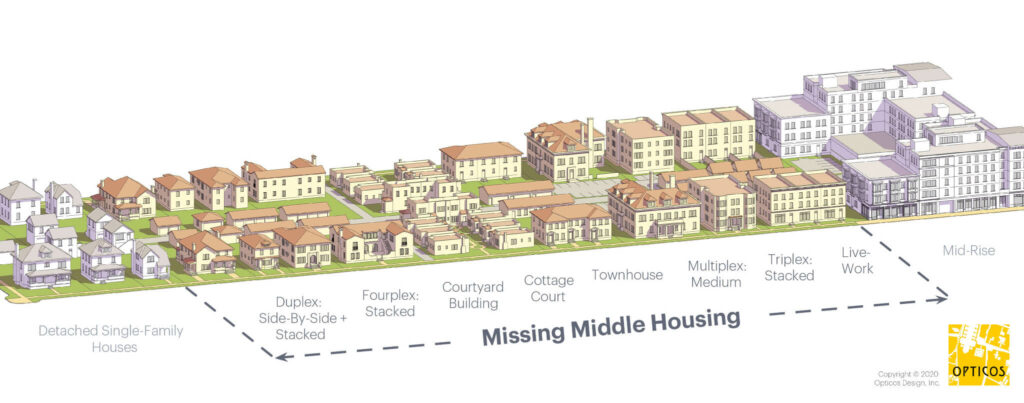Middle Housing is the Solution
Housing equity and climate change all require more housing density.

Steering out of a housing crisis requires leadership. And Councilors Claire Syrett and Jennifer Yeh are spot on (“HB 2001 will serve our community better by supporting Eugene’s climate and housing goals”): Eugene needs many more types of housing for different types of households, for a whole host of reasons. The solutions that are being presented through the city’s Middle Housing Code Amendments will help us use our residential lands in more diverse, sociable, resource-efficient ways.
It’s past time that we start designing our regulations to meet the demographics of contemporary American life and the inclusive community we strive to become.
Most people are unaware of the original legal argument used to create single-family zoning. In a 1926 decision, the U.S. Supreme Court wrote, “Very often the apartment house is a mere parasite constructed in order to take advantage of the open spaces and attractive surroundings created by the residential character of the district.”
A few weeks ago, when another letter to our City Council compared renters to rats, it was hard not to see the direct parallel in thinking about who deserves a place in our neighborhoods and who should be excluded. At its core, single-unit zoning is exclusionary, and it hasn’t changed. It leaves us ill-prepared as a community for a future that requires equity and inclusion. The housing diversity made possible by Eugene’s customized implementation of House Bill 2001 will begin to undo decades of discriminatory local laws.
Middle housing is also a critical component of our climate-responsive future. Heating and cooling energy account for 80 percent of the total energy a house uses in its lifetime. According to the analysis of a DEQ report on small housing, Sightline Institute found that just one unit of middle housing per block could reduce that block’s carbon emissions by 20 percent. Incremental change matters — it adds up when we are looking at 90 percent of our residential areas.
An even larger climate factor is transportation, and middle housing and sustainable mobility go hand in hand. We need to provide more housing in locations that can offer easy access to transit, robust bikeways, parks and safe sidewalks. By nature, single-unit zoning creates a development fabric that distributes a few people over a very large area. Everyone is far from what they need. This makes walking near-impossible, biking unlikely and transit infeasible.
Middle housing’s influence on this fabric will be slow and incremental — but when 40 percent of our greenhouse gas emissions come from transportation, we should be organizing our community in a way that lets people choose not to drive.
Syrett and Yeh are thinking about all of these issues, as we need them to be. We need our policy work to accomplish more than one thing at a time.
We certainly need to take every opportunity to provide new diverse housing options when all reputable research and our own expansive local process supports it, and a state law requires it by summer. The same loud voices blaming developers for unaffordable housing are watching their own homes’ grow in value by 15 to 20 percent each year. According to the Oregon Office of Economic Analysis, homeowners earn 40 times the profit builders earn. The problem we have is supply; our soaring housing prices reflect a staggering unmet demand.
As a housing advocate for 1000 Friends of Oregon who also engages in communities across the state, my daily work is to protect our farms and forests while fighting for housing policies that serve the whole community. I’ve seen firsthand how Oregon’s cities are implementing HB 2001, and the public engagement in Eugene is among the most inclusive and thoughtful public processes in the state. 1000 Friends of Oregon is excited to see Eugene take bold action to increase housing access and to address critical equity and climate issues. The proposed Middle Housing Code Amendments will help.
Alexis Biddle is 1000 Friends of Oregon’s Great Communities Program Director and Staff Attorney. He graduated from the University of Oregon with a Juris Doctor and a Master of Community and Regional Planning. He is also President of BEST.